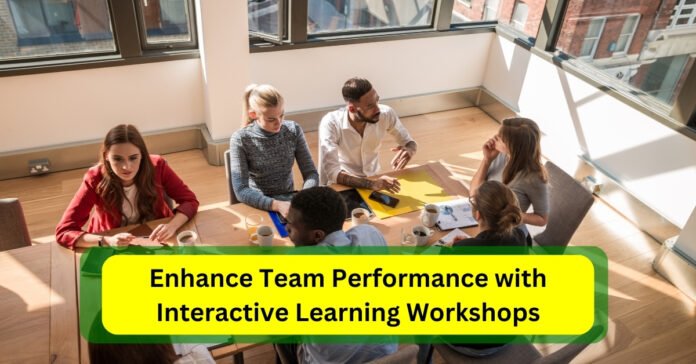
Interactive workshops serve as a dynamic approach to fostering team learning and collaboration. These sessions prioritize participation and engagement over passive listening, incorporating hands-on activities, group collaborations, and real-world problem-solving to enhance skill development and teamwork among participants. In this article, we will explore how these workshops effectively contribute to team skill enhancement and cohesion.
How Workshops Foster Team Development
1. Promoting Collaborative Learning
Collaborative learning occurs when participants work together to address challenges, share insights, and accomplish tasks. Within interactive workshops, this model encourages team members to exchange experiences and learn collectively. Activities such as group discussions, brainstorming sessions, and role-playing enhance communication and cooperation, resulting in a more cohesive team that operates with greater synergy and effectiveness.
2. Boosting Employee Engagement
Hands-on training captivates employees by immersing them in active participation. Rather than passively absorbing information, they engage in tasks that parallel their everyday responsibilities. This practical focus keeps employees attentive and invested, allowing them to apply their new knowledge immediately. Additionally, hands-on training facilitates rapid feedback, enabling participants to rectify mistakes and enhance their skills swiftly. Engaged employees tend to be more motivated and productive, benefiting the entire team.
3. Enhancing Communication Proficiency
Effective communication is crucial for team success, and interactive workshops play a vital role in improving this skill. Through role-playing and group discussions, participants practice articulating their thoughts and providing constructive feedback. These exercises not only enhance team members’ communication abilities but also bolster their collaborative efficiency. By refining communication skills, interactive workshops enable teams to resolve issues more swiftly and work seamlessly together.
4. Engaging Learning Experiences
Interactive learning workshops motivate participants to engage actively in the educational process. Rather than merely observing, attendees engage in discussions, role-playing exercises, and practical tasks that reflect real-life scenarios. This active involvement makes the learning experience enjoyable and aids in information retention. The more participants immerse themselves, the more effectively they grasp and remember the material. By emphasizing practical engagement, these workshops empower teams to enhance their skills and collaborate more efficiently.
5. Strengthening Team Dynamics
Team-building workshops are designed to enhance collaboration among team members. These sessions aim to bolster communication, trust, and teamwork—key components of any successful team. Participants take part in activities that simulate workplace challenges, allowing them to work together to tackle problems. Through these collaborative efforts, they learn to appreciate each other’s strengths and improve their communication skills, thus fostering better teamwork and a stronger sense of unity.
6. Enhancing Skill Competence
Skill development training provides employees with the necessary tools to perform their jobs more effectively. In these interactive workshops, participants engage in real tasks within a structured framework, receiving immediate feedback and learning from their peers. This approach not only builds confidence and efficiency among employees but also enhances their problem-solving abilities and job satisfaction, leading to improved overall performance.
7. Leadership Development Programs
Leadership development workshops are tailored to cultivate better leadership qualities among team members. These training sessions enhance skills such as decision-making, emotional intelligence, and effective communication. Strong leaders guide their teams, solve problems, and foster a positive work atmosphere. By equipping participants with leadership skills, these workshops prepare them to tackle challenges and motivate their teams towards success.
8. Targeted Corporate Training Initiatives
Corporate training programs are centered on developing practical skills essential for employees’ roles. Interactive workshops allow participants to engage in exercises that closely align with their everyday tasks, enhancing job-related skills. These programs often target specific industries to ensure relevance and applicability. By gaining hands-on experience, employees can execute their responsibilities more effectively and stay informed about industry developments, resulting in overall performance enhancement.
9. Assessing the Impact of Interactive Workshops
To evaluate the effectiveness of interactive workshops, organizations should monitor improvements in team performance, communication, and employee engagement post-session. Surveys, participant feedback, and performance evaluations can provide insights into how effectively the workshops help participants apply new skills in their work environment. By tracking progress and adapting based on feedback, companies can ensure that their workshops continue to facilitate team growth and improvement.
Transforming Interactive Workshops into a Catalyst for Team Development
Interactive workshops present an excellent opportunity for teams to acquire new skills and enhance collaboration. By integrating engaging, hands-on activities, these workshops encourage active participation, enabling team members to effectively grasp and apply new competencies.
From fostering communication and teamwork to nurturing leadership abilities, interactive workshops offer a myriad of advantages that contribute to team success. By prioritizing practical skill development and promoting collaboration, these sessions lead to improved performance and the creation of a more cohesive workforce.In Pune, the best team-building workshop company provide unique opportunities to enhance team dynamics and drive workplace success.

